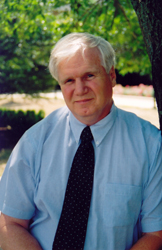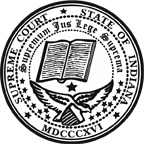IU East to host Indiana Supreme Court oral argument April 23
The Indiana Supreme Court will visit Indiana University East on Tuesday, April 23, to hear oral argument. The court case will be argued in Vivian Auditorium, located in Whitewater Hall.
The oral argument is open to the media and public, though seating is limited. Vivian Auditorium will open at 11:45 a.m. for people to be seated and the oral argument will begin at 12:45 p.m. Once the oral argument begins further admittance by visitors to Vivian Auditorium will not be permitted.
Following the oral argument, a public reception will be held at 1:45 p.m. in The Gallery, also located in Whitewater Hall.
The oral argument will be streamed live at indiana.edu/~video/stream/liveflash.html?filename=Indiana_Supreme_Court_IUE.
The event is sponsored by the Criminal Justice Program of the IU East School of Humanities and Social Sciences and the Wayne County Bar Association.
Robert Ramsey, associate professor of criminal justice at IU East, said he appreciates the Indiana Supreme Court Justices coming to IU East so that students and Wayne County area residents have an opportunity to see the court and better understand how the court operates.
“The Indiana Supreme Court last visited Indiana University East in 2006 and following that visit I received many positive comments from those who attended and who found the experience of watching an oral argument session enjoyable and educational,” Ramsey said. “I would certainly urge anyone who can attend to take advantage of this somewhat rare opportunity to watch the Indiana Supreme Court in a live session.”
Ramsey is organizing the event along with the assistance of Bruce Metzger of the Wayne County Bar Association and Wayne County Superior Court One Judge Charles K. Todd Jr.
“Wayne County is truly fortunate to host the Indiana Supreme Court this April for oral arguments. This provides an opportunity for Wayne County residents, as well as those in neighboring communities, to witness firsthand the judicial branch of our government in action,” Todd said.  “The Justices of the Indiana Supreme Court, as well as the Judges of the Indiana Court of Appeals, have worked hard to conduct oral arguments throughout the state of Indiana for some time now to allow the citizens of Indiana to observe, in part, the work that they do.”
“The Justices of the Indiana Supreme Court, as well as the Judges of the Indiana Court of Appeals, have worked hard to conduct oral arguments throughout the state of Indiana for some time now to allow the citizens of Indiana to observe, in part, the work that they do.”
The Supreme Court will hear arguments in the case of Brian Yost v. Wabash College, Phi Kappa Psi Fraternity, Inc., Phi Kappa Psi Fraternity – Indiana Gamma Chapter at Wabash College, and Nathan Cravens, 54S01-1303-CT-161. A former fraternity pledge sued the college, local fraternity chapter, and national fraternity after being injured in activities involving several members of the fraternity. The trial court awarded summary judgment in favor of the defendants. The Court of Appeals affirmed, unanimously as to the national fraternity and by a 2 to 1 vote as to the college and local fraternity chapter. Yost v. Wabash College, 976 N.E.2d 724 (Ind. Ct. App. 2012), vacated. The Supreme Court has granted a petition to transfer the case and has assumed jurisdiction over the appeal. The Court of Appeals opinion can be found at in.gov/judiciary/opinions/pdf/10021201tac.pdf.
The argument will last approximately 40 minutes, with each side having about 20 minutes to argue. The Court will take the matter under advisement and hand down a decision after considering the case. There is no timeline for a decision.
Media Policy for Indiana Supreme Court Oral Arguments
Photographing and recording the argument is permitted under certain conditions and with prior approval. To request audio or video coverage of the argument or to reserve a seat, media must contact Public Information Officer, Kathryn Dolan at kathryn.dolan@courts.IN.gov by April 19 at noon. Also, media will be required to follow standards governing media as outlined in this order in.gov/judiciary/files/order-other-2013-49s00-1301-ms-61.pdf.
Briefly, standards include:
Still and Broadcast Photography Rules
• Must arrive 30 minutes in advance of oral argument for set-up
• Still and video photographers must remain in place for the entire argument
• No flash photography is allowed
• No lighting kits may be set-up inside the courtroom
• Pool arrangement may be required
• Those using personal computing devices must be seated in the back of the room
• Audio or video cannot be captured on personal computing devices

